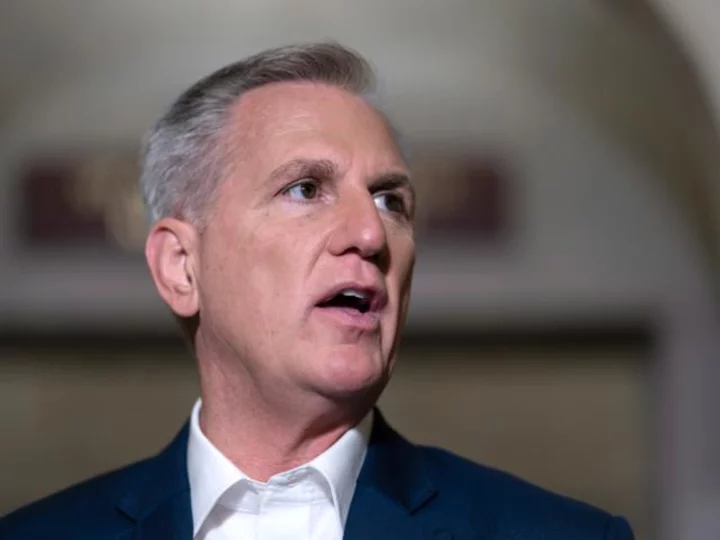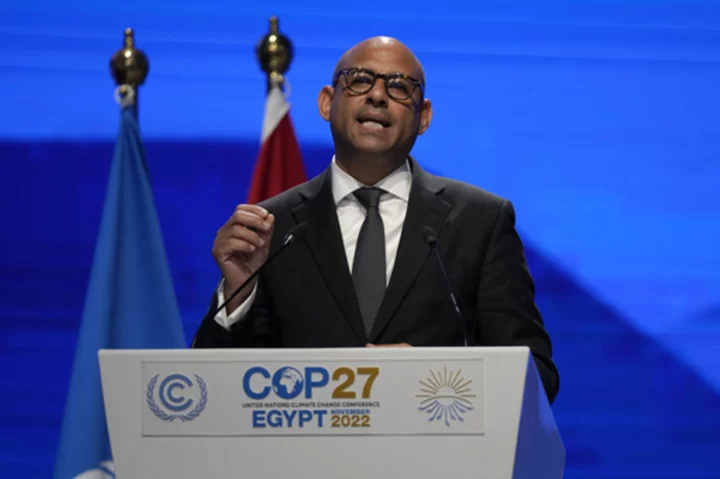House Speaker Kevin McCarthy helped secure a debt limit deal -- now he has to secure its passage in the House, with little room for error and a looming threat to his speakership.
In a win for McCarthy, the bill cleared a key hurdle Tuesday evening when the powerful House Rules Committee voted 7-6 to advance the debt ceiling bill to the floor. The bill will come to floor Wednesday for debate and a final passage vote before it goes to the Senate.
The Rules Committee vote had been highly anticipated due to the fact that some of the loudest conservative critics of the bill are members of the panel.
The timeframe to get the bill passed through both chambers of Congress and signed into law is extremely tight. Lawmakers are racing the clock to avert a catastrophic default ahead of June 5, the day the Treasury Department has said it will no longer be able to pay all of the nation's obligations in full and on time.
In another positive sign for the bill's prospects in the House, a wide range of members on both sides of the aisle -- many of them moderates -- appear poised to coalesce behind the deal to avert default. Republicans believe they are pushing toward 150 Republican votes or more, two sources told CNN.
That's more than a majority of the Republican conference, which McCarthy has been promising for days he could get on the bill.
"If you think I failed you, I'm sorry. But if you think I failed, I think you're wrong," McCarthy told GOP members of the debt limit deal Tuesday night behind closed doors.
Key hurdle to clear
To win the speakership, McCarthy agreed to name three conservative hardliners -- -- GOP Rep. Chip Roy of Texas, Rep. Thomas Massie of Kentucky and Rep. Ralph Norman of South Carolina -- to the Rules committee, a major concession since usually the panel is stacked with close allies of the leadership.
Roy and Norman have both emerged as leading critics of the bipartisan debt limit bill.
In the lead up to the rule vote, pressure grew on Massie as it was unclear how he would vote. If he did not support the rule, the debt limit bill may have been unable to advance to the House floor.
But when the committee met to consider the bill, Massie said he anticipated he would support the rule.
"I want to see the rule (first) -- it's not printed yet, it's not been read, but I anticipate voting for this rule," Massie said.
In January, Massie told CNN he was reluctant to vote against rules to stop bills in their tracks.
"I would be reluctant to try to use the Rules Committee to achieve a legislative outcome, particularly if it doesn't represent a large majority of our caucus," Massie said at the time. "So I don't ever intend to use my position on there to like, hold somebody hostage -- or hold legislation hostage."
Another key concession McCarthy made to win the speakership that looms over the effort to push the debt limit deal: Any member of the House can move to force a vote to topple the speaker known as a motion to vacate.
Roy made the strongest threat yet to McCarthy's gavel during an interview with Glenn Beck, saying that if the deal can't be killed in rules or on the floor: "Then we're going to have to then regroup and figure out the whole leadership arrangement again."
The comments were confirmed to CNN though his spokesperson.
Republican Rep. Jim Jordan of Ohio said Tuesday that he's not worried about McCarthy's speakership. "I think he is doing a good job," he said.
Rep. Patrick McHenry said Tuesday he was not worried about McCarthy losing his speakership and defended the deal he helped cut.
"With a narrow majority in the House, we have the most conservative outcome we possibly could," McHenry said.
"I'm proud of the package. I wanted more. I absolutely wanted more, (but) what we have here is better than what was about to come."
Asked if the speaker's job is now in jeopardy, McHenry said, "No."
$1.5 trillion reduction in budget deficits
The bill would reduce budget deficits by $1.5 trillion over a decade, according to the Congressional Budget Office's analysis of the package, released Tuesday evening. By contrast, the debt limit legislation passed by House Republicans in late April would have cut deficits by $4.8 trillion, according to the agency.
Under the deal negotiated with the White House, discretionary spending would decrease by $1.3 trillion over the decade, while mandatory spending would be cut by $10 billion and revenues would decrease by $2 billion, on net.
The CBO's score also contains one potential complication for McCarthy. The work requirements provisions in the package would boost enrollment in the food stamps program by 78,000 people in an average month when fully implemented, as well as increase spending by $2.1 billion over the decade.
The legislation calls for increasing the upper age limit of adults subject to the existing work requirement to age 55, up from the current age 50. But veterans, people experiencing homelessness and former foster youth of all ages would be exempt.
Changes to the work requirement provisions in the Temporary Assistance for Needy Families program would reduce spending by $5 million over the decade.
House Republicans were adamant about increasing work requirements in safety net programs, which they said would lead to less dependency on government aid.
The package would also rescind $1.4 billion in funding for the Internal Revenue Service, but this would decrease revenues by $2.3 billion over the decade, resulting in a net increase in the deficit of $900 million, over the period, the CBO said. The agency anticipates that cutting that funding would result in fewer enforcement actions and a reduction in revenue collections.
As part of the deal with the White House, some $20 billion of the $80 billion funding boost the IRS is receiving over the next decade from the Inflation Reduction Act would be diverted to partially make up for reductions in other discretionary spending.
This story and headline have been updated with additional developments.









